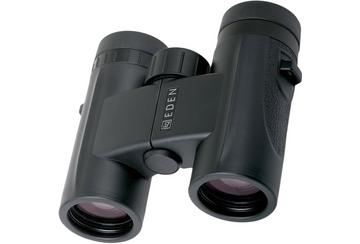What are good safari binoculars?
When you go on safari you, of course, hope to run into many beautiful animals. But what if that lion, leopard or rhino is standing just a little too far away? With the right binoculars you can still look at them from up close. In general a magnification of 8x or 10x is enough. Keep in mind that many animals only show themselves at twilight. Are you planning to go out at twilight? Choose a pair that will still show you the best details even with little light. Select an objective of at least 42 and think about the twilight factor. The higher the twilight factor, the more details you will be able to see. Are you only going out during the day to look for The Big Five? If so a diameter of 32 will suffice.
- 1
Eden Binoculars HD 8x32
207 reviews- Best price-quality safari-binoculars
- Magnification factor: 8x
- Diameter front lens: 32
- Twilight factor: 16
- Field of view at 1000 meters: 131 meters
In stock£109.49 - 2
Leica Trinovid 10x42 HD binoculars
3 reviews- Best high-end safari-binoculars
- Magnification factor: 10x
- Diameter front lens: 42
- Twilight factor: 20.5
- Field of view at 1000 meters: 113 meters
± 3 weeks£1,150.00
Check out all safari-binoculars
What do you need to pay attention to when purchasing safari binoculars?
Magnification factor of the pair
To properly spot wild animals it is best if you choose binoculars with a 8 or 10 magnification. A magnification larger than 10 will leave you with a very narrow field of view and an image that is difficult to keep stable. Binoculars with a magnification smaller than 8 will, obviously, not bring the image close enough.
Objective diameter
The diameter of the objective is important because on the one hand it determines the light output and the viewing experience of the binoculars (in this case larger is better) and on the other hand it determines the weight and size of the binoculars. As such it is a compromise between the quality of the image and the weight and size.









